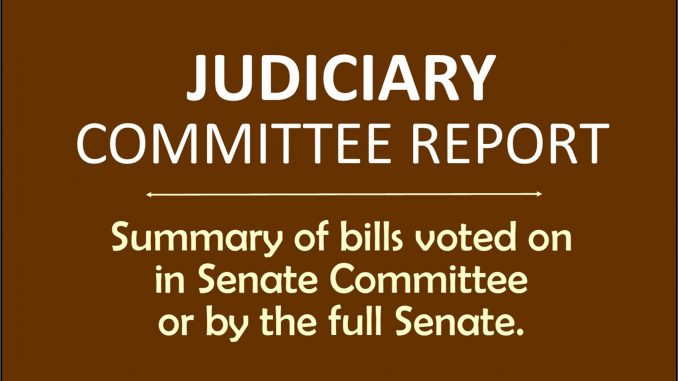
SF 158 – Post-conviction relief and underlying trial court record
SF 273 – Sexual misconduct with offenders
SF 275 – Assault by threat of a targeted attack and cyber-harassment
SF 339 – State employee defense and indemnification
FLOOR ACTION:
SF 158 – Post-conviction relief and underlying trial court record
Senate File 158 is an Iowa Bar Association proposal that addresses access to underlying criminal court files in applications for post-conviction relief (PCR). The bill deletes current Code language, which reads that if an “application for post-conviction relief is not accompanied by the record of the proceedings, then the respondent shall file with its answer the record or portions thereof that are material to the questions raised in the application.”
The bill inserts new Code language requiring the underlying trial court record and any previous application for post-conviction relief to automatically become part of the record in a PCR claim. The bill further requires clerks of court to make the underlying trial court record accessible to the applicant’s attorney, the county attorney and the Attorney General. If the court record is not available in electronic format, the clerk must convert it to electronic format and make it available. In addition, any previous application for PCR must be converted to electronic format if necessary and made available.
In PCR cases, no court order will be required for the applicant’s attorney, the county attorney and the Attorney General to get access to the underlying trial court record. In addition, the bill prohibits the Judicial Branch from charging applicants, county attorneys and the Attorney General for access to the court record.
[3/20: 49-0 (Vacancy: Danielson)]
SF 273 – Sexual misconduct with offenders
SF 273 increases the penalty from an aggravated misdemeanor to a “D” felony when any peace officer or Department of Corrections employee, contractor, vendor, volunteer or any agent of the Department engages in a sex act with an offender if the peace officer or employee has knowledge that the person is committed to the Department’s custody.
The increased penalty will also apply to officers, employees or agents of a Judicial District Department of Correctional Services (community based corrections), a juvenile detention facility or a county jail. A “D” felony is punishable by up to five years in prison and a fine of at least $750 but not more than $7,500. An aggravated misdemeanor is punishable by up to two years in prison and a fine.
The Department of Corrections has tried for years to increase penalties.
[3/18: 48-0 (Excused: Dawson; Vacancy: Danielson)]
SF 275 – Assault by threat of a targeted attack and cyber-harassment
SF 275 establishes the criminal offense of assault by threat of a targeted attack. It will be a “D” felony when a person threatens to cause serious injury or death to people assembled in a public place, a school building or any occupied structure other than a single-family residence when the people threatened reasonably believe there is a possibility of death or serious injury, or have a reasonable expectation that the threat will be carried out. A “D” felony is punishable by up to five years in prison and a fine of at least $750 up to $7,500. “Public place” is defined as an indoor area, privately or publicly owned, where the public has access by right or by invitation, express or implied, regardless of whether or not payment is required.
The bill also adds a behavior that would be considered criminal harassment: cyber-harassment. It will be considered cyber-harassment when a person makes an online communication using an electronic device or through social media with the intent to threaten, intimidate or alarm another person. The person must knowingly send or post comments, requests, suggestions or threats of physical harm to or about another or the other person’s property without legitimate purpose and in a manner that a reasonable person would fear physical or emotional harm. Cyber-harassment will be second-degree harassment, a serious misdemeanor, punishable by up to one year in jail and a fine of at least $315 but not to more than $1,875.
[3/19: 47-2 (No: Hogg, R. Taylor; Vacancy: Danielson)]
SF 339 – State employee defense and indemnification
SF 339 makes changes to the State Tort Claims Act. This change is necessary to ensure that any state employee in an action against an employee is defended and indemnified. According to the Attorney General’s office, this Code language change is needed because of an Iowa Supreme Court ruling in the Godfrey case. This language will also ensure that victims of state employee behavior may be awarded damages.
[3/18: 48-0 (Excused: Dawson; Vacancy: Danielson)]
SF 532 – Notice and opportunity to repair construction defects
SF 532 sets up a required process to help resolve construction disputes before any class-action lawsuit is filed relating to construction defects. It sets out time limits for the process and conditions to be met before a claimant goes to court. No court action can proceed until a claimant complies with the requirements set of the bill. This will apply only to new construction and class actions. This required process relating to an opportunity to repair constructions defects will only apply to a claim for injury to property and will not apply when there is a personal injury or a wrongful death claim.
[3/20: 42-7 (No: Bisignano, Bolkcom, Boulton, Celsi, Dotzler, Jochum, Petersen; Vacancy: Danielson)]
